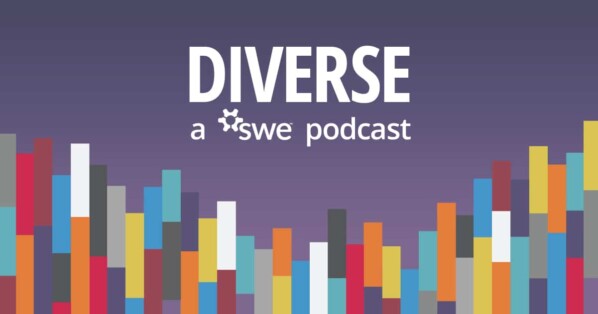Written by GradSWE Member Kalie Knecht. Updated/Edited by SWE Content & Programs.
Impostor syndrome is nicely explained by this quote from Neil Gaiman – award-winning author of American Gods, Coraline, The Sandman, and many more:
Some years ago, I was lucky enough invited to a gathering of great and good people: artists and scientists, writers and discoverers of things. And I felt that at any moment they would realise that I didn’t qualify to be there, among these people who had really done things.
On my second or third night there, I was standing at the back of the hall, while a musical entertainment happened, and I started talking to a very nice, polite, elderly gentleman about several things, including our shared first name. And then he pointed to the hall of people, and said words to the effect of, “I just look at all these people, and I think, what the heck am I doing here? They’ve made amazing things. I just went where I was sent.”
And I said, “Yes. But you were the first man on the moon. I think that counts for something.”
And I felt a bit better. Because if Neil Armstrong felt like an impostor, maybe everyone did. Maybe there weren’t any grown-ups, only people who had worked hard and also got lucky and were slightly out of their depth, all of us doing the best job we could, which is all we can really hope for [1].
Nobody is immune to impostor syndrome, but women and under-represented minorities in STEM may be more susceptible to it due to a sense of not belonging and the additional worry of only being in space because they are a ‘diversity pick’ [2].
Impostor syndrome isn’t something that we will one day conquer – it is a conversation that we will have to revisit many times over our careers. It is important to be compassionate with yourself and remember that you are enough. This can be challenging, but here are some tips that may get you into that mindset.
1. View yourself through the eyes of someone who admires you
I have been reading You Are a Badass by Jen Sincero, and it has really skewed my thinking in a positive direction. One piece of advice that Jen gives is to look at yourself from the perspective of your biggest fan.
Have you ever noticed how when someone you admire goes out and does something phenomenal, you’re happy for her or him, but you’re not surprised – of course they did something phenomenal, they’re a phenomenal person! But to get yourself to see how amazing you are is like pushing a giant marshmallow up a hill.
-Jen Sincero, Author of You Are a Badass
According to Jen, your biggest fan isn’t connected to your insecurities and negative beliefs about yourself – all they see is your true glory and potential.
There are people in your life who think that you are an absolute rockstar. Next time impostor syndrome rears its head, think about yourself in the way that they think about you!
2. Appreciate Your Unique Talents
This is another tip I got from You are a Badass, and it has really helped me stay above the fray.
Each of us has special gifts and talents to share with the world, and it is precisely our uniqueness that makes us awesome. This is also why we shouldn’t compare ourselves to others – deciding that someone else’s uniqueness is better than ours won’t do us any favors.
It is important to appreciate and recognize your talents! Write down a few things that you are good at, and remind yourself of that throughout the day. Dolly Parton would make a great personal cheerleader, and she has the same advice:
Dolly Parton: Motivational Speaker pic.twitter.com/jKo9bYVLN0
— Netflix (@netflix) November 25, 2019
3. Share your experiences with others
It is important to stay connected to others now more than ever. Take the opportunity to reconnect with old friends, or network with new ones. A good strategy for dealing with impostor syndrome is talking with others about how you feel because there is a good chance that you will find others having the same thoughts!
References:
1. https://neil-gaiman.tumblr.com/post/160603396711/hi-i-read-that-youve-dealt-with-with-impostor
2. https://www.technologynetworks.com/tn/articles/feeling-like-a-fraud-impostor-syndrome-in-stem-324839
3. http://gradswe.swe.org/gradswe-blog/social-distancing-our-new-normal
4. http://gradswe.swe.org/gradswe-blog/surviving-the-new-reality-tips-for-working-from-home-as-a-graduate-student
5. http://gradswe.swe.org/gradswe-blog/professional-development-from-home
 About the Author
About the Author
Kalie Knecht is a PhD candidate in Nuclear Engineering at UC Berkeley. You can find her on Twitter.
Related Content
- Engineering for Good
- Chasing the Imposter Syndrome Away
- GradSWE Wants to Help Engineering Graduate Students Around the World
Author
-

SWE Blog provides up-to-date information and news about the Society and how our members are making a difference every day. You’ll find stories about SWE members, engineering, technology, and other STEM-related topics.






